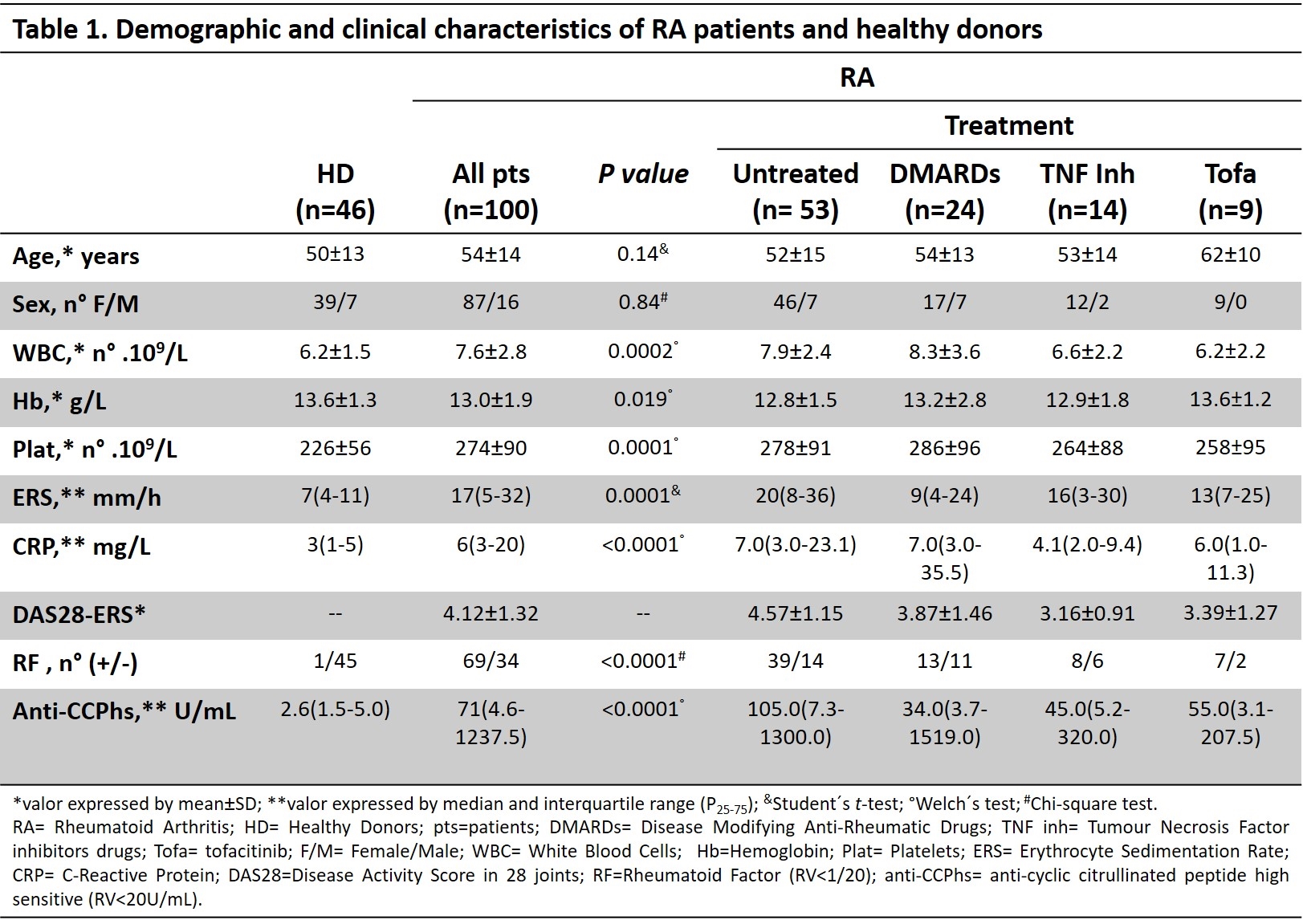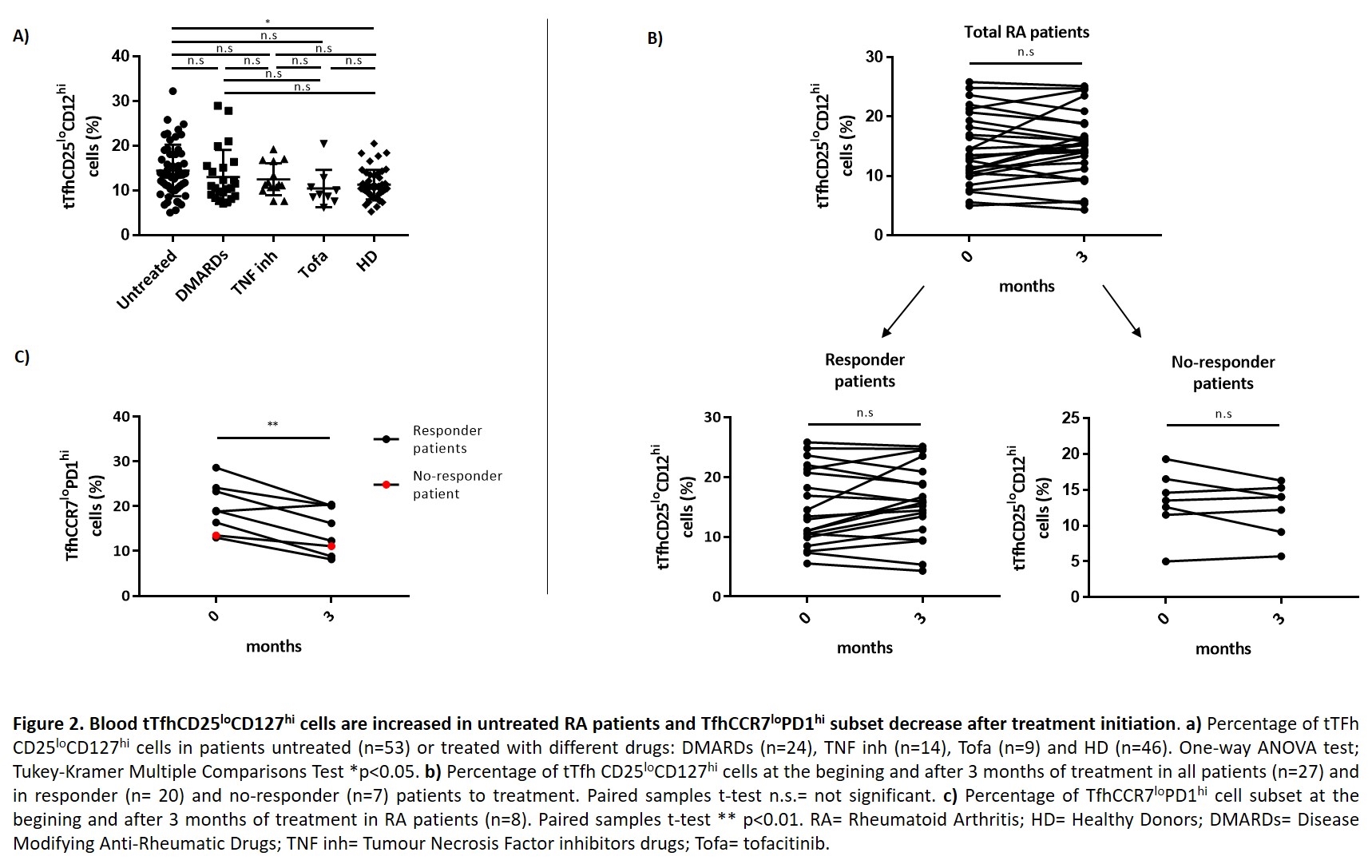Session Information
Session Type: Poster Session B
Session Time: 9:00AM-11:00AM
Background/Purpose: Rheumatoid Arthritis (RA) is a chronic inflammatory disease characterized by the production of autoantibodies like rheumatoid factor and anti- citrullinated protein. CD4+ follicular helper T cells (Tfh) play a critical role in immunity by supporting several events involved in antibody (Ab) production by B cells, including class-switch recombination, germinal center B cell differentiation, and affinity maturation. Remarkably, high levels of Tfh are associated with humoral autoimmunity. We aimed to evaluate the frequency of Tfh in RA patients under different treatment conditions and to characterize the Tfh according their ability to produce Interleukin (IL)-17 and Interferon (IFN)-γ, cytokines with opposite roles in Ab production.
Methods: One hundred subjects over 18 years diagnosed with RA according to ACR/EULAR 2010 criteria untreated and under different treatments were recruited. Twenty-seven of these patients were re-evaluated after 3 months of treatment and treatment response was determined according to EULAR response criteria. Forty-six healthy donors (HD) sex- and age-matched were recruited as controls (table 1). Ex-vivo Tfh frequency was analyzed by flow cytometry (Figure 1a). Cryopreserved peripheral blood mononuclear cells were used to determine the frequency of IL-17- and IFN-γ-producing Tfh. GraphPad Prism version 7.00 software was used for statistical analysis and p values < 0.05 were considered significant.
Results: The frequency of total Tfh (tTfh: CD3+CD4+CD45RA–CXCR5+CD25loCD127hi) and of CCR7loPD1hi Tfh, a subset with demonstrated increased ability to promote Ab response, were significantly increased in RA patients in comparison to HD (p=0.004, p=0.01, respectively) (Figure 1b). When the RA patients were segregated according to the presence of autoAbs, the increase in Tfh was limited to seropositive patients (p=0.04; p=0.03; respectively) (Figure 1c). The activated Tfh subset CCR7loPD1hiICOS+ was also increased in RA patients (p=0.01) (Figure 1b) but not in seropositive group of patients (p=0.13) (Figure 1c). Interestingly, RA patients showed a tendency to increase the percentage of Tfh IL-17+IFN-γ– (p=0.057) but no changes were observed in the frequency of IFN-γ+IL-17– producing Tfh (p=0.82) respect to HD. When analyzing the effect of treatment, we determined that only untreated patients showed increased frequency of tTfh compared to HD (p=0.03) (Figure 2a). There were no statistically significant differences in the percentage of tTfh in RA patients after 3 months of treatment (p=0.36), even in the group with good/moderate response (p=0.16) (Figure 2b). Noteworthy, a decrease in the percentage of TfhCCR7loPD1hi subset (p=0.004) (Figure 2c) was observed after treatment.
Conclusion: The RA patients had increased frequencies of tTfh and the subsets TfhCCR7loPD1hi and TfhCCR7loPD1hiICOS+, with the better capacity to induce Ab responses. tTfh and the subset CCR7loPD1hi, were increased only in patients with ongoing autoreactive humoral response, and treatments only decrease the subset CCR7loPD1hi. Studies aimed to understand the dynamics of Tfh subsets may be of relevance to understand and treat pathologies with uncontrolled Ab-responses.
To cite this abstract in AMA style:
Ferrero P, Onofrio L, Acosta C, Zacca E, Ponce N, Mussano E, Cadile I, Onetti L, Werner M, Costantino A, Acosta Rodriguez E, Gruppi A. Dynamics of Follicular Helper T Cells Subsets in Rheumatoid Arthritis Patients Before and After Treatment [abstract]. Arthritis Rheumatol. 2020; 72 (suppl 10). https://acrabstracts.org/abstract/dynamics-of-follicular-helper-t-cells-subsets-in-rheumatoid-arthritis-patients-before-and-after-treatment/. Accessed .« Back to ACR Convergence 2020
ACR Meeting Abstracts - https://acrabstracts.org/abstract/dynamics-of-follicular-helper-t-cells-subsets-in-rheumatoid-arthritis-patients-before-and-after-treatment/



